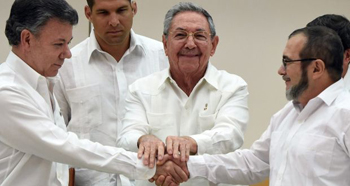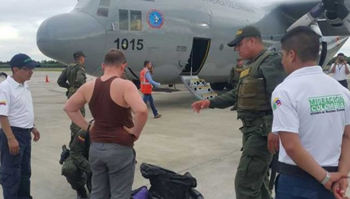International Affairs
 |
 |
 |
 |
 |
 |
 |
Francis Silent on Deporting Colombian Cubans
President Juan Manuel Santos of Colombia has just returned from Havana where he announced, along with the dictator Castro and the FARC, that they are close to reaching a final "peace" agreement that generously benefits the Colombian narco-guerrillas.
 “We are close to a final peace accord,” guerilla leader Timoleón Jimenez said, after shaking hands with Colombian president Santos at the signing ceremony in Havana, which was attended by the UN secretary general, Ban Ki-moon.
“We are close to a final peace accord,” guerilla leader Timoleón Jimenez said, after shaking hands with Colombian president Santos at the signing ceremony in Havana, which was attended by the UN secretary general, Ban Ki-moon.
The accord includes security guarantees for the FARC guerrillas during its planned transition to a peaceful political party. However, a much harsher fate awaits the Cuban refugees in Colombia. In a public statement in Colombia after arriving in Havana, Santos said with unusual severity that the close to 1,300 Cubans who had fled the island prison – presently living in crowded conditions in several sites in Colombia – will ruthlessly be deported to Cuba.
The inhumane decision of President Santos was confirmed by the Colombian Director of Immigration Christian Krüger, who, coming from a meeting with the Colombian president, said with no less cruelty: "Those who do not leave the country voluntarily will be deported."
 The gravity of this statement is augmented by the fact that for the 1,300 Cubans, who include children, the elderly and pregnant women, to leave the country "voluntarily" means escaping into the jungle of Darien, one of the most closed and dangerous jungles of Latin America and the world. So, it is pushing them to almost certain death.
The gravity of this statement is augmented by the fact that for the 1,300 Cubans, who include children, the elderly and pregnant women, to leave the country "voluntarily" means escaping into the jungle of Darien, one of the most closed and dangerous jungles of Latin America and the world. So, it is pushing them to almost certain death.
Meanwhile, Pope Francis, who during his visit to Cuba promised to go to Colombia if the "peace" agreement with the FARC is signed and who has spoken so often on the human rights of migrants, has remained silent on the drama of those more than a thousand Cubans who are about to be returned to the prison island of Cuba.
The words of the Pope and his "politically correct" positions always favor the migrants. Do they not apply to Cubans fleeing Communism?
It is a cruel injustice and a lack of mercy to the oppressed that cries out to Heaven. The question naturally arises: Is the silence of Francis a command coming from Havana?

Javier González first published this article in Spanish at
Apuntes de Destaque Internacional on August 4, 2016.
Readers can contact him at: destaque2016@gmail

Colombian Pres. Santos agrees with the FARC leader under the patronage of dictator Raul Castro
The accord includes security guarantees for the FARC guerrillas during its planned transition to a peaceful political party. However, a much harsher fate awaits the Cuban refugees in Colombia. In a public statement in Colombia after arriving in Havana, Santos said with unusual severity that the close to 1,300 Cubans who had fled the island prison – presently living in crowded conditions in several sites in Colombia – will ruthlessly be deported to Cuba.
The inhumane decision of President Santos was confirmed by the Colombian Director of Immigration Christian Krüger, who, coming from a meeting with the Colombian president, said with no less cruelty: "Those who do not leave the country voluntarily will be deported."

Colombia started the deportation of the betrayed Cuban refugees on August 5
Meanwhile, Pope Francis, who during his visit to Cuba promised to go to Colombia if the "peace" agreement with the FARC is signed and who has spoken so often on the human rights of migrants, has remained silent on the drama of those more than a thousand Cubans who are about to be returned to the prison island of Cuba.
The words of the Pope and his "politically correct" positions always favor the migrants. Do they not apply to Cubans fleeing Communism?
It is a cruel injustice and a lack of mercy to the oppressed that cries out to Heaven. The question naturally arises: Is the silence of Francis a command coming from Havana?

Posted August 17, 2016
Apuntes de Destaque Internacional on August 4, 2016.
Readers can contact him at: destaque2016@gmail
______________________
______________________
 Volume I |
 Volume II |
 Volume III |
 Volume IV |
 Volume V |
 Volume VI |
 Volume VII |
 Volume VIII |
 Volume IX |
 Volume XI |
 Special Edition |
 Special Edition |


